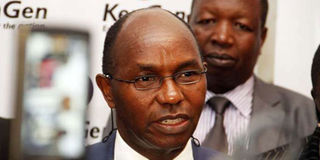Kenyans to pay more for power as KenGen seeks to raise tariffs

KenGen managing director Albert Mugo. The power producer is seeking to increase the prices at which it sells hydropower to Kenya Power. FILE PHOTO | DIANA NGILA | NATION MEDIA GROUP
What you need to know:
- KenGen is seeking to raise the tariffs for its major hydropower plants with an installed capacity of 765 Megawatts (MW) or 47 per cent of the firm’s total power capacity.
- KenGen managing director Albert Mugo said the proposed tariff increment is informed by recent expansion of the company’s hydropower capacity and the need to deliver returns to shareholders of the Nairobi bourse listed firm.
Power producer KenGen is seeking to increase the prices at which it sells hydropower to Kenya Power, setting the stage for higher electricity bills for homes and businesses.
KenGen has sought approval from the Energy Regulatory Commission (ERC) to raise the tariffs for its major hydropower plants with an installed capacity of 765 Megawatts (MW) or 47 per cent of the firm’s total power capacity.
The higher tariffs look set to strengthen Kenya Power’s hand in its push to increase electricity prices for homes and business to cover rising operation expenses.
The government has opposed Kenya Power’s quest to increase retail tariffs, arguing that it goes against the policy of delivering cheap electricity needed to ease the burden on households and make Kenya a competitive country.
KenGen managing director Albert Mugo said the proposed tariff increment is informed by recent expansion of the company’s hydropower capacity and the need to deliver returns to shareholders of the Nairobi bourse listed firm.
“When we signed the PPA (power purchase agreement) in 2009 there was a projection for capacity increase, giving room to revise the rates,” said Mr Mugo without giving details of the figures.
He cited Kindaruma hydropower station, whose power capacity has increased from 48 megawatts (MW) to 72 MW over the period.
KenGen is seeking higher wholesale tariff for Seven Forks Hydro stations on Tana River, which includes Masinga power station (40 MW), Kamburu (94 MW), Gitaru (225 MW), Kindaruma (72 MW) and Kiambere (168 MW).
Others are Turkwel power station (106 MW) and Sondu Miriu which has a capacity of 60 MW.
KenGen has a total power capacity of 1,617 MW, out of which 820 MW is hydropower, 518 MW is geothermal, 25.5 MW is wind energy while the rest is thermal sources.
This amounts to about a third of power bought by Kenya Power for onward sale to home and businesses, a signal that an increase in the bulk tariffs would put pressure on the ERC to review retail tariffs to cover the additional costs.
Kenya Power has recently sought the ERC approval to raise consumer charges to cover rising operation costs and upgrade its transmission network.
But Ministry of Energy officials have ruled out any increment, putting a fresh hurdle to Kenya Power’s plan to open a new avenue for growing its bottom-line.
In 2004, the government opted to subsidise KenGen’s bulk electricity purchase agreement with Kenya Power to cushion consumers.
KenGen was directed to sell power to Kenya Power at Sh1.76 per kilowatt hour instead of the wholesale rate of Sh2.36 per unit. The government opted to pay the difference of Sh0.60 on behalf of Kenya Power.
Presently, homes consuming 200 kWh pay Sh3, 398 or Sh17 a unit, up from Sh2,783 or Sh13.90 a unit in April 2014.
Electricity remains one of the biggest inputs of production for Kenyan manufacturers, a fact that has prompted the government to invest heavily in cheaper renewable power sources such as geothermal and wind farms.
Hydropower accounted for 37 per cent of electricity consumed by homes and businesses last month, second to geothermal (48 per cent) and expensive thermal power at 13 per cent.




